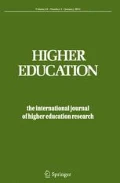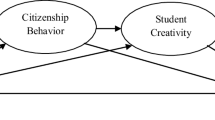Abstract
Around the world, changing funding policies have pushed for university departments to find increased external project-based funding. While this trend is widely acknowledged, mixed views exist about implications for faculty members’ academic practices. Regarding doctoral education, researchers have raised concern that external funding will push doctoral supervisors to be more directive in their supervision of doctoral students’ research projects. However, the empirical evidence supporting such concern is limited. The aim of the current study was, first, to develop and validate a scale allowing us to measure the degree of supervisor direction. Second, the aim was to examine the hypothesis that directive supervision is more likely to occur when the doctoral student’s research project is supported by external funding secured by the supervisor. A total of 1690 doctoral students at a research-intensive Danish university participated in the study. Three scales, including a directive supervision scale, were developed and validated by means of exploratory and confirmatory factor analysis. Our hypothesis could be confirmed for the health sciences, but not the natural sciences. Results from the humanities and social sciences were ambiguous.

Similar content being viewed by others
References
Abell, N., Springer, D. W., & Kamata, A. (2009). Developing and validating rapid assessment instruments. New York: Oxford University Press.
Acker, S., Hill, T., & Black, E. (1994). Thesis supervision in the social sciences: Managed or negotiated? Higher Education, 28, 483–498.
Armstrong, S. J. (2004). The impact of supervisors’ cognitive styles on the quality of research supervision in management education. British Journal of Educational Psychology, 74, 599–616.
Bair, C., & Haworth, J. (2005). Doctoral student attrition and persistence: A meta-synthesis of research. In J. Smart (Ed.), Higher education: Handbook of theory and research (vol. 19, pp. 481–534). Netherlands: Springer.
Bowen, N., & Guo, S. (2012). Structural equation modeling. New York: Oxford University Press.
Cleys-Kulik, A.-L., & Estermann, T. (2015). DEFINE thematic report: Performance-based funding of universities in Europe. Brussel: European University Association. Retrieved from www.eua.be.
Cohen, J. (1988). Statistical power analysis for the behavioral sciences (2nd ed.). Hillsdale, NJ: Lawrence Erlbaum Associates.
Cryer, P. (1996). The research student’s guide to success. Maidenhead: Open University Press.
Cullen, D., Pearson, M., Saha, L., & Spear, R. (1994). Establishing effective Ph.D. supervision. Canberra: Australian Government Publishing Service.
Danish Ministry of Higher Education and Science (2015, December, 10). Retrieved from http://ufm.dk/en?set_language=en&cl=en.
de Valero, F. Y. (2001). Departmental factors affecting time-to-degree and completion rates of Doctoral students at One Land-Grant Research Institution. The Journal of Higher Education, 72(3), 341–367.
Deuchar, R. (2008). Facilitator, director or critical friend? Contradiction and congruence in doctoral supervision styles. Teaching in Higher Education, 13(4), 489–500.
Direct. (2015). In Merriam-Webster.com. Retrieved December 10, 2015, from http://www.merriam-webster.com/dictionary/direct.
Engebretson, K., Smith, K., McLaughlin, D., Seibold, C., Terrett, G., & Ryan, E. (2008). The changing reality of research education in Australia and implications for supervision: A review of the literature. Teaching in Higher Education, 13(1), 1–15.
Franke, A., & Arcidsson, B. (2010). Research supervisors’ different ways of experiencing supervision of doctoral students. Studies in Higher Education, 36(1), 7–19.
Fraser, R., & Matthews, A. (1999). An evaluation of the desirable characteristics of a supervisor. Australian Universities Review, 42(1), 5–7.
Gardner, S. K. (2007). “I heard it through the grapevine”: Doctoral student socialization in chemistry and history. Higher Education, 54, 723–740.
Gatfield, T. (2005). An Investigation into Ph.D. Supervisory management styles: Development of a dynamic conceptual model and its managerial implications. Journal of Higher Education Policy and Management, 27(3), 311–325.
GCA—Graduate Careers Australia. (2014). Postgraduate Research Experience 2014. A report on the postgraduate research experience perceptions of recent higher degree research graduates. Melbourne: Edvina Lindsay. Retrieved from http://www.graduatecareers.com.au/wp-content/uploads/2015/09/Postgraduate_Research_Experience_2014.pdf.
Golde, C. (2005). The role of the department and discipline in doctoral student attrition: Lessons from four departments. The Journal of Higher Education, 76(6), 669–700.
Green, P., & Usher, R. (2003). Fast supervision: Changing supervisory practice in changing times. Studies in Continuing Education, 25(1), 37–50.
Gulbrandsen, M., & Smeby, J.-C. (2005). Industry funding and university professors’ research performance. Research Policy, 34(6), 932–950.
Gurr, G. M. (2001). Negotiating the “Rackety Bridge”: A dynamic model for aligning supervisory style with research student development. Higher Education Research & Development, 20(1), 81–92.
Halse, C., & Mowbray, S. (2011). The impact of the doctorate. Studies in Higher Education, 36(5), 513–525.
Harman, G. (2001). University-industry research partnerships in Australia: Extent, benefits and risks. Higher Education Research & Development, 20(3), 245–264.
Harman, G. (2002). Producing Ph.D. graduates in Australia for the knowledge economy. Higher Education Research & Development, 21(2), 179–190.
Heath, T. (2002). A quantitative analysis of Ph.D. students’ views of supervision. Higher Education Research and Development, 21(1), 41–53.
Herrmann, K. J., Wichmann-Hansen, G., & Jensen, T. K. (2014). Quality in the PhD process - A survey among PhD students at Aarhus University. Aarhus University. http://www.au.dk/fileadmin/www.au.dk/kvalitetiphd/KVALITET_I_PHD__UK_.pdf.
Hockey, J. (1996). Motives and meaning amongst Ph.D. supervisors in the social sciences. British Journal of Sociology of Education, 17(4), 489–506.
Holligan, C. (2005). Fact and fiction: A case history of doctoral supervision. Educational Research, 47(3), 267–278.
Hoskins, C. M., & Goldberg, A. D. (2005). Doctoral student persistence in counselor education programs: Student-program match. Counselor Education and Supervision, 44(3), 175–188.
Ives, G., & Rowley, G. (2005). Supervisor selection or allocation and continuity of supervision: Ph.D. students’ progress and outcomes. Studies in Higher Education, 30(5), 535–555.
Kam, B. H. (1997). Style and quality in research supervision: The supervisor dependency factor. Higher Education, 34(1), 81–103.
Kamler, B. (2008). Rethinking doctoral publication practices: Writing from and beyond the thesis. Studies in Higher Education, 33(3), 283–294.
Kline, R. B. (2005). Principles and practice of structural equation modeling (2nd ed.). New York: The Guildford Press.
Lamm, R. (2004). Nurture or challenge in research higher degree supervision. Paper presented at the AARE Conference, Melbourne, Australia.
Lee, A. (2008). How are doctoral students supervised? Concepts of doctoral research supervision. Studies in Higher Education, 33(3), 267–281.
Li, S., & Seale, C. (2007). Managing criticism in Ph.D. supervision: a qualitative case study. Studies in Higher Education, 32(4), 511–526.
Mainhard, T., van der Rijst, R., van Tartwijk, J., & Wubbels, T. (2009). A model for the supervisor–doctoral student relationship. Higher Education, 58(3), 359–373.
Malfroy, J. (2011). The impact of university-industry research on doctoral programs and practices. Studies in Higher Education, 36(5), 571–584.
Manathunga, C. (2005). Early warning signs in postgraduate research education: A different approach to ensuring timely completion. Teaching in Higher Education, 10(2), 219–233.
Manathunga, C., & Goozée, J. (2007). Challenging the dual assumption of the ‘always/already’ autonomous student and effective supervisor. Teaching in Higher Education, 12(3), 309–322.
McCallin, A., & Nayar, S. (2012). Postgraduate research supervision: A critical review of current practice. Teaching in Higher Education, 17(1), 63–74.
Mendoza, P. (2007). Academic capitalism and doctoral student socialization: A case study. Journal of Higher Education, 78(1), 71–96.
Morton, M., & Thornley, G. (2001). Experiences of doctoral students in mathematics in New Zealand. Assessment & Evaluation in Higher Education, 26(2), 113–126.
Murphy, N., Bain, J., & Conrad, L. (2007). Orientations to research higher degree supervision. Higher Education, 53(2), 209–234.
Neumann, R. (2007). Policy and practice in doctoral education. Studies in Higher Education, 32(4), 459–473.
Overall, N. C., Deane, K. L., & Peterson, E. R. (2011). Promoting doctoral students’ research self-efficacy: Combining academic guidance with autonomy support. Higher Education Research & Development, 30(6), 791–805.
Pearson, M., & Kayrooz, C. (2004). Enabling critical reflection on research supervisory practice. International Journal for Academic Development, 9(1), 99–116.
Pole, C., Sprokkereef, A., Burgess, R., & Lakin, E. (1997). Supervision of doctoral students in the natural sciences: Expectations and experiences. Assessment and Evaluation in Higher Education, 22(1), 49–63.
Raudla, R., Karo, E., Valdmaa, K., & Kattel, R. (2015). Implications of project-based funding of research on budgeting and financial management in public universities. Higher Education, 70(6), 957–971.
Sabharwal, M. (2013). Comparing research productivity across disciplines and career stages. Journal of Comparative Policy Analysis: Research and Practice, 15(2), 141–163.
Sampson, K. A., & Comer, K. (2010). When the governmental tail wags the disciplinary dog: Some consequences of national funding policy on doctoral research in New Zealand. Higher Education Research & Development, 29(3), 275–289.
Sinclair, M. (2004). The pedagogy of ‘good’ Ph.D. supervision: A national cross-disciplinary investigation of Ph.D. supervision. Australia: Central Queensland University, Faculty of Education and Creative Arts.
Smeby, J.-C. (2000). Disciplinary differences in Norwegian graduate education. Studies in Higher Education, 25(1), 53–67.
Stubb, J., Pyhältö, K., & Lonka, K. (2014). Conceptions of research: the doctoral student experience in three domains. Studies in Higher Education, 39(2), 251–264.
Tabachnick, B., & Fidell, L. (2007). Using multivariate statistics (5th ed.). Boston: Pearson Education.
Tammi, T. (2009). The competitive funding of university research: The case of Finnish science universities. Higher Education, 57(5), 657–679.
Taylor, S., & Beasley, N. (2005). A handbook for doctoral supervisors. London: Routledge.
The Statistical Practice of Danish Universities [Universiteternes Statistiske beredskab] (2015. December, 10). Retrieved from http://www.dkuni.dk/Statistik/Universiteternes-statistiske-beredskab.
Turner, G. (2015) PRES 2015. The research student journey. Higher Education Academy. Retrieved from https://www.heacademy.ac.uk/sites/default/files/pres_2015.pdf.
Vilkinas, T. (2008). An exploratory study of the supervision of Ph.D./research students’ theses. Innovative Higher Education, 32, 297–311.
Villalba, J. A., & Young, J. S. (2012). Externally funded research in counsellor education: An overview of the process. Counsellor Education and Supervision, 51(2), 141–154.
Wisker, G. (2012). The good supervisor. Supervising postgraduate and undergraduate research for doctoral theses and dissertations (2nd ed.). Hampshire: Palgrave Macmillan.
Woolhouse, J. (2002). Supervising dissertation projects: Expectations of supervisors and students. Innovations in Education and Teaching International, 39(2), 137–144.
Wright, T. (2003). Postgraduate research students: People in context? British Journal of Guidance & Counselling, 31(2), 209–227.
Wright, T., & Cochrane, R. (2000). Factors influencing successful submission of Ph.D. theses. Studies in Higher Education, 25(2), 181–195.
Young, M. (2015). Competitive funding, citation regimes, and the diminishment of breakthrough research. Higher Education, 69(3), 421–434.
Zhao, C.-M., Golde, C. M., & McCormick, A. C. (2007). More than a signature: How advisor choice and advisor behaviour affect doctoral student satisfaction. Journal of Further and Higher Education, 31(3), 263–281.
Author information
Authors and Affiliations
Corresponding author
Rights and permissions
About this article
Cite this article
Wichmann-Hansen, G., Herrmann, K.J. Does external funding push doctoral supervisors to be more directive? A large-scale Danish study. High Educ 74, 357–376 (2017). https://doi.org/10.1007/s10734-016-0052-6
Published:
Issue Date:
DOI: https://doi.org/10.1007/s10734-016-0052-6




